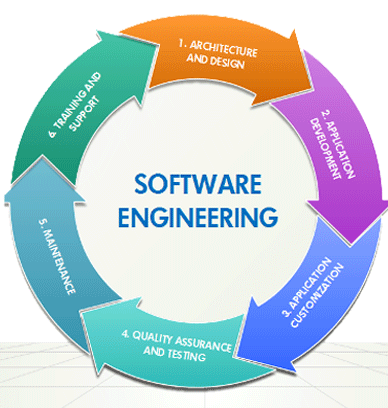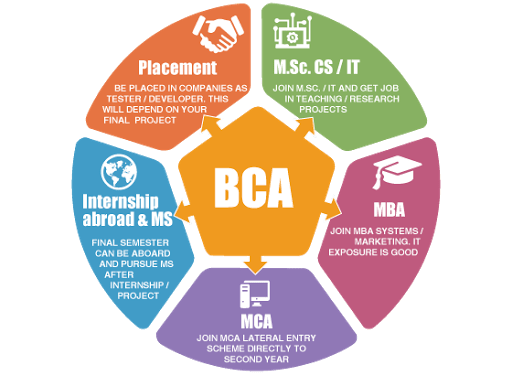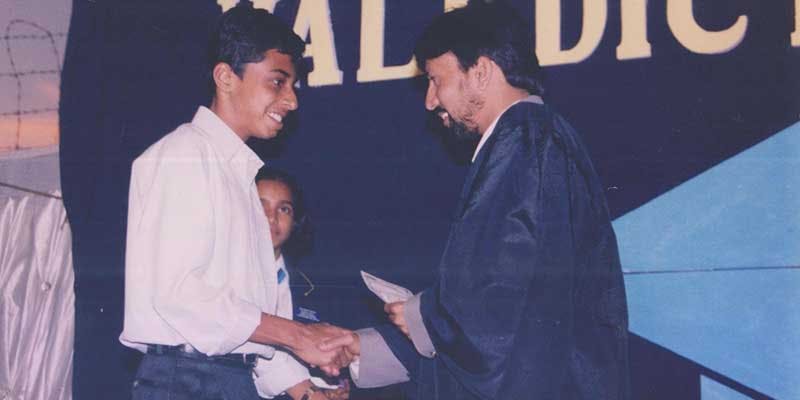BCA – Bachelor of Computer Applications Course Details, Fees, Subjects and Admission in Top BCA Colleges in India.
by 2,301 views2

Contents
Bachelor of Computer Applications
India’s first ever computer was installed at the ISI (Indian Statistical Institute, Kolkata) premises in 1956. D. Dutta, M.M. Mukherjee, and A. Roy were the three men behind India’s tryst with computers. Since then, she made tremendous progress in the field of computing, and indigenously manufactured supercomputers are frequently exported to many developed and developing countries. Domestically produced Indian supercomputers are aiding genetics, new drug discovery, weather forecasting, military, smart grids, space missions and many more. The National Supercomputing Mission is launched with the objective of setting up a network of supercomputers within 2020.
It is a no-brainer that India is going to need thousands of computer programmers in the coming decade. BCA full form is Bachelor of Computer Applications which is a three-year-long undergraduate degree program in the discipline of computer applications.
Best BCA Colleges in India
- Institute of Management Studies, Noida
- Women’s Christian College, Chennai
- DAV College, Chandigarh
- Stella Maris College, Tamil Nadu
- Madras Christian College, Tamil Nadu
- Xavier Institute of Computer Applications, Ahmedabad
BCA Colleges in Bangalore
Qualifications
Anyone who has completed their higher secondary studies (10+2) with 45% or more is deemed to be eligible for admission to BCA.
Our Advice
BCA is recommended for anyone who loves programming, analytical thinking, number crunching and also solving logical problems. Students can opt for psychometric assessments including MBTI (Myers-Briggs Type Indicators) before making any final decision.
Career Options after BCA
The objective of any BCA program is to impart the learners with exhaustive knowledge of computer programming using C/C++, Python, Java, etc. A BCA graduate can quickly make an enviable career in a large Indian or multinational IT organization as a software tester, business analyst, database administrator, system administrator, web designer/developer, technical support (voice and non-voice process), sales (technical), network engineer, quality assurance, software consultant, onsite support engineer and many more challenging job profiles. TCS, Wipro, Infosys, Cisco, Citibank, American Express, HSBC, CTS, IBM and many domestic/international companies recruit dozens of BCA graduates every year from a large number of colleges and universities.
BHEL, MTNL, NSDL,and BSNL are some of the big names in the government sector who routinely recruit BCAs from numerous Indian universities and institutes. The booming banking sector also hires them as probationary officers.
BCA Course Details
The BCA course is designed to equip the learners with a firm academic base which will be beneficial for developing an intriguing career in the field of computer applications. The program also discusses the analysis and synthesis of computer systems, computer applications, and also information systems.
BCA Syllabus
- Mathematics and Statistics
- Programming in High-Level Languages and Introduction to Algorithms
- Database and Networking Concepts
- Business Communication and Financial Management
- New Technologies: Big Data, Cloud Computation, Soft Computing, etc.
- Industrial/University Project
Choosing an Institute for BCA
- Affiliation:The BCA institute or college should be recognized by AICTE and UGC. A degree is useless in the job market and also for further education if the degree-granting institution or university is not accredited by government regulatory bodies. Also, one cannot go for a master if the student enrolls in a diploma course after finishing school.
- Curriculum: The course curriculum should be regularly updated with latest subjects. Many universities and colleges still teach old languages like COBOL.
- Specialization: Refer to the “Should I Specialize?” sub-section in this article.
- Faculty:The student should thoroughly check the academic qualifications and teaching experiences of the faculties. Also, they need to accurately inquire about the number of research papers submitted by the computer science department and also the number of doctorate professors, to get an elaborate idea about the college or university they are desirous to get admitted.
- Infrastructure:High-speed wireless and wired internet in classrooms and hostels, mess, projectors and digital blackboards, pre-recorded lectures, library, washing and laundry, guarded premises (CCTV and security guards),etc. are essential so that the student can concentrate on the studies only. Another important criterion for selecting the right institute or university is the doctor-on-call facility to handle any medical emergency. Some universities have recently started installing sanitary napkin vending machines in the proximity of their female hostels. Also, indoor and outdoor gaming facilities like table tennis, basketball, volleyball, cricket, etc. are necessary too, to fight the boredom and daily grind of studies.
- Placement:Getting a job after passing out is a requirement for many for paying off student debts. One should always ask the final year students about the ongoing placement activities in the campus and also seek in-depth reports from the placement cell before getting admitted.
- Tuition:It is said that stretch your legs according to leg according to the size of your quilt. The meaning of the proverb is that one should only go for such things which that person can afford to. The students are advised to select only those colleges or universities which fit their budget. It is worth mentioning that apart from tuition, hostel and mess; there are additional charges like development fees, examination fees, alumni fees, library fees, etc. Also, self-financed private colleges/institutes and universities are far more expensive than the government ones. As the standard of teaching is typically better in government colleges and universities when compared to their private counterparts, the industry tends to have a bias for those BCA graduates churned out by government colleges/universities.
BCA Eligibility
All those students who have passed their high school leaving examination or equivalent with mathematics as a subject in the qualifying examination can apply for the course of BCA. While the minimum pass percentage is forty-five, some colleges have hiked it to fifty or sixty. The candidate should be at least seventeen years of age at the time of entrance examination for BCA. There is no upper limit though. However, the mean age varies between twenty to twenty-five years.
Universities for BCA
- Christ University, Bengaluru
- SRM University, Chennai
- Banaras Hindu University, Varanasi
- BharatiVidyapeeth Deemed University, Pune
- Maharishi Markandeshwar University, Ambala
BCA Entrance Exam
- GGS Indraprastha University Common Entrance Test for BCA: May 12, 2018
- Kalinga Institute of Industrial Technology Entrance Examination for BCA: April 15 to 24 2018
- Lucknow University Computer Science Admission Test for BCA: Fourth week of May 2018
- PES University Scholastic Aptitude Test for BCA: April 20 to May 15, 2018
(N.B.: All dates are tentative)
BCA Subjects
| Year 1 | |
| Semester 1 | Semester 2 |
| Basic Programming in C (Theory and Lab) | Case Tools Lab (Only CIA) |
| English for Communications | Discrete Mathematics Primer |
| Basic Mathematics and Introductory Statistics | Operating Systems |
| Hardware Lab (Only CIA) and PC Software Lab | Data Structures |
| Digital Computing Basics | Data Structures Lab and Visual Programming Lab |
| Year 2 | |
| Semester 3 | Semester 4 |
| College Algebra | Computer Networks |
| Accounting for Programmers | Basic Java Programming |
| Software Engineering and Database Management Systems (DBMS) | Java Lab and Web Technologies Lab |
| Beginning C++ | DBMS Lab |
| C++ Lab, Oracle Lab, and Domain Lab (Only CIA) | Language Lab (Only CIA) |
| Year 3 | |
| Semester 5 | Semester 6 |
| Programming in Unix and Python | Designing and Analyzing Algorithms |
| Data Analytics/Big Data and Object Oriented Analysis and Design Using Unified Modeling Language | Computer Architecture and Client-Server Computing |
| Graphics, Animation, and User Interface Design | Cloud Computing and Multimedia Applications |
| Web Designing Academic Project | Advanced DBMS |
| Lab: Graphics & Animation, Python, Unix, and Data Analytics/Big Data | Introductory Lessons in Soft Computation |
(N.B.: A student must take some electives in the final year)
Job Opportunities after BCA
The syllabi of BCA is primarily made up of four key areas of study; namely, personality and soft skills development, logic reasoning and college level mathematics, core computation and major project (application of acquired knowledge). BCA graduates are virtually fit for any roles which are offered to computer science (CS)/engineering and information technology (IT) graduates. In the field of IT, BCAs are typically more preferred over BEs and BTechs. Ideally; most of the students go for an MCA, MBA/PGDM/PGDBA/PGDBM, MScIT, MScCS, MCM (master of computer management), PGDCA, or even an integrated PhD in CS after finishing BCA; but all those who are planning to get employed right after college can find a wide array of lucrative job profiles in this domain.
- Software Engineer
- Software Developer
- Technical Support Engineer
- Technical Writer
- Software Tech Engineer
- Software Sales Engineer
- Web Designer
Should I Specialize?
Any person wishing to study BCA should go through all the electives offered by the institute or university he or she is planning to enroll. It will serve two purposes. The students will be able to eliminate those colleges from the list which do not offer the specializations they are aspiring. Also; if any educational institution does not provide the opportunity for majoring in latest technologies like cloud computing, big data and data analytics, mobile applications development, wearable computing, supercomputing, artificial intelligence, natural language processing, neural networking, soft computing, machine learning, internet of things, virtual/augmented reality,etc.; then one might need to reconsider the options. Some of the most popular specializations among students are as follows.
- Programming Languages
- Systems Analysis
- Database Management
- Word Processing
- Accounting Applications
- Internet Technologies
- Music and Video Processing
- Animation
- Personal Information Management
Making a Difference
Harsha Suryanarayana was a legendary Indian programmer who was a Red on the site of Top Coder. More popularly known by his online alias Humblefool, Harsha sustained his position as being the highest ranked coder till 2007. He scored a perfect 100/100 in three ICSE subjects and used to finish each examination paper in half the time allotted. Fondly knows as Lord Harsha among his peers in the college, this young man founded three successful startups including MyCodeSchool after graduating.
Every year he used to train others for the ACM ICPC contest. On 15Th June 2014, he succumbed to injuries in an unfortunate road accident. Harsha enjoyed far more in this thirty-two years than many others experience in their lifetime. People remember him not just for his programming prowess, but also for his broad sense of ethics and integrity.



